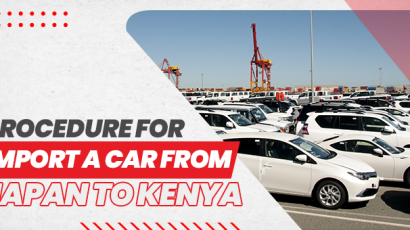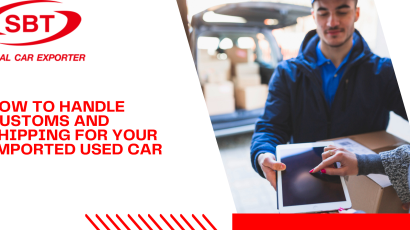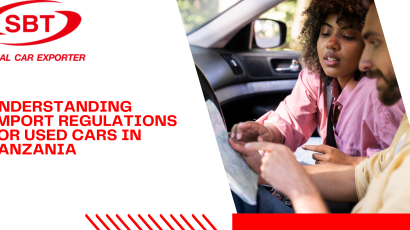
Importing a used car can be a smart and exciting way to get the vehicle you want, often at a more affordable price. However, it comes with specific paperwork requirements that vary depending on your country’s regulations and the car’s origin.
Therefore, knowing what documents you need is crucial, as missing paperwork can delay your car’s arrival or lead to additional fees. This guide covers the essential used car import documents and requirements to ensure a seamless importing experience.
1. Bill of Lading
The Bill of Lading (BOL) is one of the most critical documents in import paperwork for used cars. It is issued by the shipping company when the car is loaded onto a vessel for transportation. This document serves as a receipt and contains essential information about the shipment, including the car’s make, model, and VIN (Vehicle Identification Number), along with the sender and recipient details. The BOL is required at the port of entry and may be requested by customs officials to confirm ownership and transport specifics.
Why It’s Important
The BOL not only acts as proof of shipment but also ensures that the importer (you) has the legal right to receive the car once it reaches its destination. Moreover, in many cases, a BOL can also be used to confirm that the car has cleared all exit requirements from its country of origin.
2. Commercial Invoice
The Commercial Invoice is another essential document necessary for car import documentation. This document provides a breakdown of the car’s sale, including the price, vehicle specifications, and details of the buyer and seller. The Commercial Invoice is vital for customs purposes, as it helps determine the vehicle’s import duty and tax.
Why It’s Important
Customs officials use the Commercial Invoice to calculate import taxes and duties. An accurate invoice can prevent issues such as incorrect duty assessments, ensuring you do not end up overpaying or facing fines.
3. Import Declaration Form
An Import Declaration Form is essential to notify customs of your intent to bring a vehicle into the country. This document usually includes detailed information about the car, including its value, weight, and specifications. However, depending on the country, you may have to submit this form electronically or physically at the port of entry.
Why It’s Important
The Import Declaration Form is necessary for customs clearance, as it helps authorities assess the correct duties and taxes. This form also acts as an official record of the car’s import, which can be useful in case of any disputes or questions regarding the vehicle’s entry.
4. Proof of Ownership (Title or Certificate of Registration)
The Title or Certificate of Registration is a crucial document that verifies you legally own the car you’re importing. This document includes the car’s VIN, the name and address of the previous owner, and other essential details about the vehicle’s registration history.
Why It’s Important
Without proof of ownership, you cannot import the car. Customs officials require this document to prevent stolen or illegally exported vehicles from entering the country. Therefore, for a smooth import process, you must ensure that the title is proper and has your name on it.
5. Customs Bond
In some countries, you may need a Customs Bond as part of your import car requirements. A customs bond acts as insurance, ensuring that you will pay all applicable duties and fees for the imported vehicle. Moreover, the bond amount often depends on the car’s value and the country’s import regulations.
Why It’s Important
A customs bond protects both you and customs authorities. If you miss any payments, customs can claim the bond to cover their dues, making it essential for compliance and smooth importation, particularly for high-value or commercial imports.
6. Emissions and Safety Compliance Documents
Many countries have strict emissions and safety standards that imported vehicles must meet. For instance, the United States requires imported cars to comply with the Environmental Protection Agency (EPA) and Department of Transportation (DOT) standards. Therefore, you may need to provide a certificate or test results showing the car meets these standards.
Why It’s Important
Safety and emissions compliance documents are essential for legally registering and driving a car in your country. As a result, failure to comply can lead to costly modifications, fines, or even the need to export the vehicle back to its origin.
7. Import Duty and Tax Receipt
After paying any necessary duties and taxes at customs, you will receive a receipt. This document is crucial as it confirms that you have met your financial obligations to customs. You may also need to show this receipt when registering your car locally.
Why It’s Important
The Import Duty and Tax Receipt proves you’ve paid all required fees, allowing your car to clear customs and be released to you. Furthermore, retaining this document is essential, as you may need it for vehicle registration and proof of purchase.
8. Bill of Sale or Purchase Agreement
The Bill of Sale or Purchase Agreement is an important document that records the transaction between the buyer and seller. It includes details like the purchase price, vehicle specifications, and signatures from both parties. Moreover, this document is necessary for customs as it provides proof of the car’s purchase and its market value.
Why It’s Important
Customs authorities may require the Bill of Sale to verify the car’s value for tax purposes. Additionally, having a documented purchase agreement can be helpful if there are any disputes over the car’s condition, payment, or ownership status.
9. Insurance Certificate
Most countries require an insurance certificate to import a vehicle. This document provides coverage for the vehicle during its journey from the country of origin to the destination port. If anything happens to the car while in transit, the insurance certificate ensures you have financial protection.
Why It’s Important
Shipping a car comes with risks such as damage or loss. Therefore, an insurance certificate offers peace of mind by ensuring that you are compensated in case of any issues during transit.
10. Power of Attorney (if using a customs broker)
If you choose to hire a customs broker to handle the import paperwork for used cars, you may need to provide a Power of Attorney (POA). This document grants the broker permission to act on your behalf, streamlining the import process and reducing paperwork.
Why It’s Important
Using a customs broker can simplify the import process, as they will handle most of the documentation and customs interactions. As a result, a POA allows them to represent you, ensuring your import is compliant with all regulations without requiring your direct involvement.
Conclusion
All in all, importing a used car can be a rewarding experience, but it requires attention to detail with all required documentation. From the Bill of Lading to the Customs Bond, each document serves an essential purpose in ensuring your vehicle clears customs and reaches you without issue.
Therefore, by understanding and preparing these used car import documents, you can avoid delays, save money, and ensure a smooth and successful import process. Before beginning your import journey, double-check your country’s specific import car requirements and consult a customs expert if necessary. Proper preparation makes all the difference, and with the right paperwork, your dream car is just a customs clearance away.










